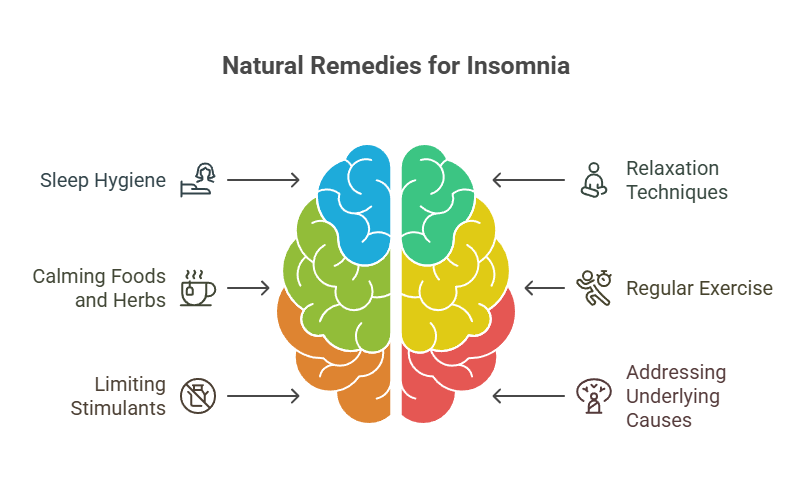Best Home Remedies for Insomnia: Safe and Healthy Ways to Sleep Better
What is insomnia, and how do you treat it the natural way?
Why does everyone have enough sleep?
FAQ About – The Best Home Remedies for Insomnia.
What is insomnia, and how do you treat it the natural way?
Not being able to fall asleep even though you’re tired? Are you not the only one who has trouble falling asleep or staying asleep once you wake up? Millions of people all over the world have trouble sleeping. While prescription pills can help temporarily, they can also cause dependency and other issues. Nature, thankfully, has safer and more long-lasting answers. In this article, we will discuss the best home remedies for insomnia, which are simple, natural ways to get better sleep without taking medicine.

Insomnia is when you can’t fall asleep, stay asleep, or wake up too early to go back to sleep. It can make you tired, cranky, or unable to focus during the day. Common causes include stress, too much time in front of a screen, and excessive worrying. Some people only have it for a few days, while others have it for weeks or longer. What’s the good news? If you have the right habits and use some simple home remedies, you can often get rid of insomnia naturally and sleep well again.
Why does everyone have enough sleep?
Sleep is important for everyone, including infants, kids, adults, and older people. It repairs muscles, keeps hormones in check, boosts the immune system, and helps the brain process information. Everything goes wrong when you don’t get enough rest. You lose focus, your moods change a lot, and you can even develop serious health problems like heart disease and depression. Getting enough sleep isn’t a luxury; it’s important for your health. Chronic lack of sleep is becoming more common, so it’s more important than ever to find safe and long-lasting solutions. Here we discuss the best home remedies for insomnia.

1. Set up a relaxing routine for going to bed—the best home remedy for insomnia.
A relaxing routine before bed helps you relax, lowers stress hormones, and gets your body ready for a deep sleep. If you do this every day, it will become a strong sleep signal that tells your body it’s okay to rest and relax. Making plans for the evenings gives your body a chance to get ready for a full night’s sleep.
Before going to bed, take a warm bath or shower.
Turn down the lights an hour before bed.
Play soft music or background noise to relax.
Do not do stimulating things like checking your email.
Include things that calm you down, like herbal tea or skin care.
2. To calm down, drink herbal teas—the best home remedies for insomnia
Chamomile, valerian root, and passionflower teas are all-natural sedatives that can help calm you down. They calm you down, help your stomach, and put you to sleep. Using these teas regularly can help you fall asleep and stay asleep better. Having tea every day also establishes a routine that your body associates with relaxation.
Apigenin is a chemical in chamomile tea that binds to brain receptors and helps you sleep.
It takes less time to fall asleep when you take valerian root.
Peppermint tea can help calm your mind and muscles.
Researchers have found that drinking lemon balm tea can help restless people.
Stay away from teas with caffeine, like black or green tea.
3. Use aromatherapy with essential oils that help you sleep—the best home remedies for insomnia.
Lavender, bergamot, and sandalwood are some of the essential oils that are known to help people relax and sleep better. Through smell, aromatherapy sends calming signals to the brain, which helps your body fall asleep more quickly and naturally. It’s one of the easiest and least expensive ways to make your bedroom a better place to sleep.
Put a few drops of lavender oil into a diffuser.
Use a carrier oil to mix essential oils with and put them on your wrists or temples.
Right before bed, give your feet a warm soak with some useful oils.
Place your head on a pillow and apply diluted lavender oil.
Take a deep breath from the bottle and feel calm right away.
4. Make the most of your bedroom—the best home remedies for insomnia
The place where you sleep is crucial to how well you rest. A cool, dark, and quiet bedroom helps the body make melatonin and keeps you from waking up too early. Your bedroom should be a safe place where you can relax and feel at ease. Often, making your space better will help you sleep better and for longer.
Maintain a comfortable temperature in the room.
Put up blackout curtains to keep light from coming in.
Earplugs or a white noise machine can help block out noise.
Eliminate clutter and electronics that you don’t need.
Use soft sheets and wall colours that are soothing.
5. Stay away from coffee, alcohol, and heavy meals—the best home remedies for insomnia
What you eat or drink in the evening can either help you sleep or keep you from falling asleep. Coffee and alcohol can keep you from falling into deep sleep, and heavy meals can make you uncomfortable and make digestion problems worse, especially if you eat them too close to bedtime. Eating well at night can help you fall asleep more easily.
Don’t drink coffee or tea in the evening.
Don’t drink alcohol three hours before going to bed.
Dinner should be over at least two to three hours before bed.
Select light meals that are simple to break down in the evening.
Keep sugary desserts away late at night.
6. Take deep breaths and meditate every day—the best home remedies for insomnia.
Deep breathing and mindfulness meditation can help calm the nervous system and lower stress. These activities will lower your heart rate and clear your mind, which will make it easier for your body to fall into a deep sleep. Furthermore, they’re simple, free, and don’t need any tools.
Try breathing in for 4 seconds, holding your breath for 7, and then letting out your breath for 8 seconds.
Use apps like Headspace or Calm to help you meditate.
To ease tension in your body, try body scan relaxation.
As you go to sleep, write in a gratitude journal.
You can find guided sleep meditations on YouTube.

7. Cut down on screen time and blue light—the best home remedies for insomnia.
Blue light from phones, TVs, and computers stops the production of melatonin. Cutting down on screen time before bed can help you fall asleep more easily and keep your body’s internal clock in sync. The light, despite your body’s exhaustion, tricks your brain into believing you are still awake.
Stay away from screens at least an hour before bed.
When it gets dark, set your device to “night mode.”
When it gets dark, read or listen to books on paper.
Put on blue light filters or glasses that block blue light.
Don’t let your phone get close to the bed.
8. Work out regularly during the day—the best home remedy for insomnia.
Being active on a regular basis can help balance your circadian rhythm, lower your stress, and help you sleep better. But time is crucial. If you work out hard too late at night, you might be too alert to fall asleep. On the other hand, gentle stretches in the evening can be soothing.
Aim to do 30 minutes of moderate exercise every day.
Walking, swimming, and yoga are some of the best ways to work out.
The best times to work out are in the morning or early evening.
Don’t do any hard workouts for 1.5 hours before bed.
Before going to bed, do some light yoga or stretching.
9. Keep a regular record of your sleep—the best home remedies for insomnia
Tracking your sleep can help you find out what habits are keeping you awake. A sleep journal can help you find what works and what doesn’t so you can change your sleep habits. Being aware of yourself is the first step to making things right.
Write down the times you go to bed, wake up, and wake up at night.
Record how much caffeine you drink, how much you exercise, and how stressed you are.
Write down how rested you feel every morning.
Note what you do every day in an app or a notebook.
Look at trends once a week to make changes.
10. Figure out how to deal with stress and worry.
Anxiety is a main reason why people can’t sleep. Thinking anxious thoughts and feeling stressed can set off your fight-or-flight response, which makes it impossible to calm down. Using techniques that deal with these thoughts can help you relax and feel calm. Taking care of your mental health is an important part of sleeping well for good.
In a “worry journal”, write down the things that bother you.
Use affirmations or mental pictures that are positive.
Learn how to do progressive muscle relaxation.
Do not read emails or watch the news before bed.
If you have chronic insomnia, you should use cognitive behavioural techniques (CBT)

Final Thought
The best home remedies for insomnia work best when used together and regularly. Pick two or three remedies to start, and make them a part of your nightly routine. If you want to sleep better, making small changes to your habits and environment can help. Your body and mind will learn that going to bed means rest over time.
Stick to a regular sleep schedule.
Make sure the place where you sleep is clean and quiet.
Don’t look at screens too much at night.
Be mindful or write in a journal to deal with stress.
Instead of quick fixes, make habits that will last.
If your insomnia doesn’t go away despite these efforts, you should see a doctor. You deserve restful nights that give your body and mind what they need.
FAQ About – The best home remedies for insomnia
Q1: How quickly do home remedies for insomnia work?
It varies from person to person depending on the nature of your work and sleeping habits; commonly it could take two to three weeks. Consistency is important. It doesn’t work overnight; natural remedies need time to help your body adjust.
Q2: Can I have chamomile tea every night?
Yes, regular use of chamomile is safe and helpful. As part of a relaxing bedtime routine, it will work best.
Q3: What about natural remedies?
Are they safe for kids and older people? Before taking any supplements, you should always talk to your doctor first, even if they seem safe. All ages can feel safer with natural remedies and regular habits like taking warm baths.
Q5: Do I have to do all of the remedies at the same time?
I recommend beginning with 1-2 remedies and gradually incorporating them into your routine. Too much to do at once can make you feel overwhelmed instead of helpful.
Q6. Can not getting enough sleep make other health issues worse?
Yes, not getting enough sleep on a regular basis does raise the risk of obesity, diabetes, heart disease, and depression. Putting sleep first is important for both your physical and mental health.
